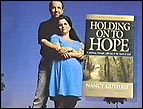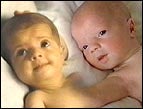

Become a CBN partner and receive The Transforming Word: Verses to Overcome Fear and Experience Peace, our special DVD/CD gift to you.
CBN Partners are making a difference sharing the Gospel of Jesus Christ. Find out how.
DAVID GUTHRIE: They wanted to do some tests over several days.
NANCY GUTHRIE: A geneticist told us he suspected that Hope had a rare metabolic disorder called Zellweger syndrome. And then he dropped the bomb on us that most children with this syndrome live less than 6 months. There's no cure, no treatment, and no survivors.
LISA RYAN (reporting): Few parents have to endure the heartbreak of burying their child. David and Nancy Guthrie have faced the grave twice now--burying two babies. They invited us into their home here in Nashville and took us on a journey deep into the heart of suffering.
LISA RYAN: I can't imagine the pain of losing one child. At that point the two of you did what was medically necessary to not have any more children. But then two years later, you find out that you are pregnant. How did you respond?
NANCY GUTHRIE: We were shocked, of course, because we thought that was not possible.
LISA RYAN (reporting): Shock turned to joy as the Guthries realized they might have a healthy child to raise and enjoy. After all, their first child, Matt, was healthy. For a child to be born with Zellweger syndrome, both parents must be carriers of the recessive gene. Nancy and David are, but they still had a 75 percent chance of delivering a healthy child. Once David and Nancy received the results of prenatal testing, they broke the news to their church congregation:
DAVID GUTHRIE (speaking before his church congregation): We are now expecting another child, a boy. And this little boy will be born with the same syndrome Hope had: Zellweger syndrome.
LISA RYAN: Why did you decide to go through with that pregnancy? So many people would have terminated it.
NANCY GUTHRIE: Well, I don't think it was a decision we made, like we considered yes or no. This was a life that God had given us. You have to understand that we had the knowledge of the pain that was ahead of us in loving and losing this child, but we also had the knowledge of the joy this child would be during his life because our memories of Hope's life were very rich. They were painful, but they were very rich.
DAVID GUTHRIE: It would have been difficult for us to understand until we had Hope in our lives for the six months that she was with us, how such a brief life, so limited in so many ways, how a child born without the ability to see or to hear or any hope of growing up, how that life could be valuable and beautiful. As we got that news the second time, we looked back and we remembered how much we learned about ourselves, how much we saw God use that experience to break down barriers all around us. Neighbors, friends, acquaintances suddenly were interested in discussing real life issues at a deeper level--all because of this little one that could never speak or hear.
LISA RYAN (reporting): So David, Nancy and their son Matt welcomed Gabriel, a second baby destined to live only a few months, into their hearts and home.
LISA RYAN: Did you ever pray for God to heal your children?
NANCY GUTHRIE: No we didn't.
LISA RYAN: Really? Why?
NANCY GUTHRIE: We did not feel an urging from the Spirit to pray for their healing. Other people did, and that was fine for us. A lot of people felt strongly that we should and that was OK. We felt that in Hope's life and in Gabe's life there was no illness that had invaded otherwise healthy bodies but that Zellweger syndrome was the essence of who God created them to be. I just sensed God speak to me clearly that the issue for me was submission to God and accepting His plan and His purpose in Hope's and Gabe's lives that we knew would be very short.
 LISA
RYAN (reporting): It was during Hope's brief life that Nancy says God spoke
many truths to her heart through the Scriptures. During her pregnancy with
Gabriel, Nancy began writing a book about her experiences called Holding
on to Hope. In the book, Nancy examines the life of Job.
LISA
RYAN (reporting): It was during Hope's brief life that Nancy says God spoke
many truths to her heart through the Scriptures. During her pregnancy with
Gabriel, Nancy began writing a book about her experiences called Holding
on to Hope. In the book, Nancy examines the life of Job.
NANCY GUTHRIE: Job was specifically chosen to suffer because of his great faith. As I looked at that I thought, 'That's something to attain to,' to be that kind of person that God would look at me and say, 'Now my servant Nancy, she'll be faithful to Me no matter what.' And I don't know that I can ever attain that, but it sure seems to me a worthy goal to be that consistently faithful to God.
LISA RYAN: In reading your book, I looked back at a Job season in my own life, and I remember one time just hanging onto that Scripture, "Though He slay me yet will I praise Him." How important is it to worship God in the midst of our pain?
NANCY GUTHRIE: It offers us perspective because when we're hurting, we're just looking down at the sorrow and pain and on our own deep hurt, but what happens in worship is in a sense we look up and we see God. We see His sufficiency. We see His majesty. We see His love for us. It gives perspective to our suffering that we could never have without true, genuine worship.
LISA RYAN: It's so easy to get stuck in our pain and even get angry. Is it OK to be angry?
DAVID GUTHRIE: I do not look down on people whose first reaction to a great tragedy in their lives is anger. But we have a choice what to do with that. I remember saying to Nancy right after we buried Hope and walked away from her grave, 'I think we thought that our faith would make this hurt less. It prepared us in a way, and I think it kept us from despair and hopelessness, but I don't think it minimized the pain of having to bury our baby, walk away, and know that in this life we wouldn't see her again.'
LISA RYAN: As a parent, tell me what it's like to love and care for a child that you know will shortly die?
NANCY GUTHRIE: You know, we determined early in Hope's life and again in Gabe's life that we did not want to spend their lives grieving their loss. Every month we had a birthday party for Hope with different groups of people, different types of settings, all different ways. It was just our way of celebrating her life and showing gratitude to God for the life He had given before it was gone. There's a richness to life when you know life is short. There's pain, but there's a richness to life.
DAVID GUTHRIE: And in an amazing way, their very condition was a daily, moment-by-moment reminder that we have this moment with them, and we also had this incredible confidence that we have eternity. And somewhere along the way, I think Nancy and I realized that this is the essence of our lives.
LISA RYAN (reporting): Today the Guthries continue to embrace what Nancy calls the "gifts of suffering." Their story has drawn national attention from major media such as Time magazine and USA Today. Even after their deaths, Hope and Gabriel are touching and transforming many lives.
 NANCY
GUTHRIE: I think perhaps what has drawn people to our story is they have seen
that faith has worked for us. Let me tell you, faith works because we have
a hope that we hold onto of being reunited with these children. The gift of
eternal life made available to us through Jesus Christ is the most significant,
most meaningful hope there is to hold onto.
NANCY
GUTHRIE: I think perhaps what has drawn people to our story is they have seen
that faith has worked for us. Let me tell you, faith works because we have
a hope that we hold onto of being reunited with these children. The gift of
eternal life made available to us through Jesus Christ is the most significant,
most meaningful hope there is to hold onto.
DAVID GUTHRIE: I will also tell you that the hardest experience of my life was holding Gabe here in our bedroom the night we could tell he was slipping away. That is the moment where our faith was exercised to the greatest degree because we watched him take his last breaths. He was in my arm as he took that last breath. But it also wasn't hard for us to imagine that he was taking his last breath here and his next breath in the presence of God. As excruciating as that moment was, it was another reminder that God has given us this brief time on earth, but our real hope, our real future, is somewhere else--it's with Him.
A caring friend will be there to pray with you in your time of need.